- Home
-
About WCCES
- WCCES History Book
- WCCES Leadership
- WCCES Executive Committee
- WCCES Presidents
-
WCCES Working Groups
>
- Admissions & New Societies Standing Committee
- Congress Standing Committee
- Constitutional Standing Committee
- Ethics Standing Committee
- Finance Standing Committee
- History & Records Management Standing Committee
- Inclusion Standing Committee
- Publications Standing Committee
- Research Standing Committee
- Special Projects Standing Committee
- UNESCO Liaison Standing Committee
- Election Task Force
- Journal-Chronicle Task Force
- Peace Education Task Force
- Task Force to Bring Back Withdrawn Societies
- Task Force on Congress Periodicity, Bidding Cycles and Number of Host Societies
- Task Force on Distance Education
- USA-UNESCO Relations Task Force
- 4th WCCES Symposium 2021
- 5th WCCES Symposium 2022
- XVIII World Congress 2024
-
Past Congresses
>
- XVII World Congress, Cancún, Mexico, 2019
- XVI World Congress, Beijing, China, 2016
- XV World Congress, Buenos Aires, Argentina, 2013
- XIV World Congress, Istanbul, Turkey, 2010
- XIII World Congress, Sarajevo, Bosnia & Herzegovina, 2007
- XII World Congress, Havana, Cuba, 2004
- XI World Congress, Chungbuk, South Korea, 2001
- X World Congress, Cape Town, South Africa, 1998
- IX World Congress, Sydney, Australia, 1996
- VIII World Congress, Prague, Czech Republic, 1992
- VII World Congress, Montreal, Canada, 1989
- VI World Congress, Rio de Janeiro, Brazil, 1987
- V World Congress, Paris, France, 1984
- IV World Congress, Tokyo, Japan, 1980
- III World Congress, London, UK, 1977
- II World Congress, Geneva, Switzerland, 1974
- I World Congress, Ottawa, Canada, 1970
- WCCES Announcements
- WCCES Statutes & By-laws
- Current Member Societies of WCCES
- Procedure to be a Member Society of WCCES
- Contact Us
-
Global Comparative Education: Journal of the WCCES
- GCE Editor's Message
- GCE Advisory Board
- GCE Editorial Team >
- GCE Policy on Publication Ethics
- GCE Submission Guidelines
- GCE Reviewing Guidelines
- GCE Vol. 1 No. 1 (Mar. 2017) >
- GCE Vol. 2 No. 1 (Mar. 2018)
- GCE Vol. 2 No. 2 (Sep. 2018)
- GCE Vol. 3 No. 1&2 (Sep. 2019)
- GCE Vol. 4 No. 1&2 (Sep. 2020)
- GCE Vol. 5 No. 1&2 (Sep. 2021)
- GCE Vol. 6 No. 1 (Sep. 2022) Special Issue
- GCE Vol. 6 No. 2 (Dec. 2022)
- GCE Vol. 7 No. 1 (June 2023)
- GCE Vol. 7 No. 2 (Sep. 2023)
- WCCES-Brill Book Series
Founders of WCCES
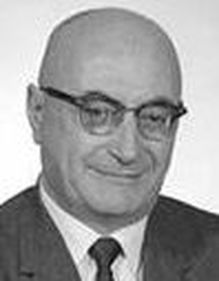
Late Professor Joseph Katz Founding President, WCCES (1970-74) University of British Columbia Canada |
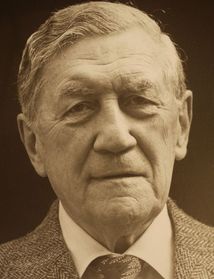
Late Professor Joseph Lauwerys
University of London, UK |
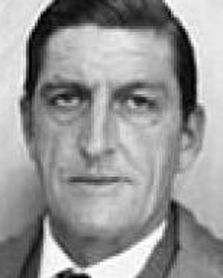
Late Mr. Leo R. Fernig
UNESCO IBE Director, Geneva (1970-74);UNESCO Assistant Director=General Education ad Interim, Paris (1974-76); Other key roles at UNESCO, Paris (1948-70); WCCES Secretary General (1978-82) |
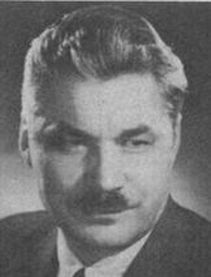
|
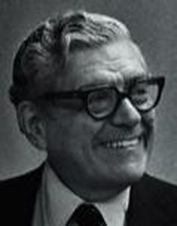
|
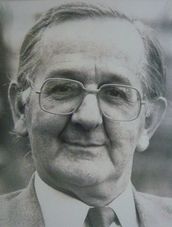
Late Professor Brian Holmes Past President, WCCES (1974-77) Co-Founder, CESE Professor and Dean Faculty of Education University of London United Kingdom |
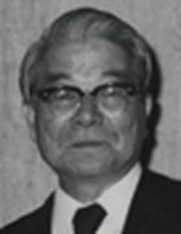
Late Dr. Masunori Hiratsuka Past President, WCCES Founding President, JCES Former Director National Institute for Educational Policy Research Japan |
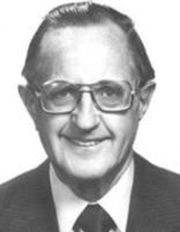
|
"The major impetus for the founding of the World Council of Comparative Education Societies (WCCES) came from a Canadian, Joseph Katz of the University of British Columbia. The first World Congress was held in Ottawa, Canada, in August 1970 during the UNESCO-designated International Education Year (IEY). Edmund King later described the way in which the idea took form (Letter to Raymond Ryba, 12 March 1998):
I was there at the time, when [Joseph] Lauwerys and Leo Fernig (often in London) and Joe Katz were laying the groundwork for the WCCES. Katz spent a year in London on sabbatical, and during that time he and Lauwerys were often together.... Lauwerys [was] the European founding partner in the nascent WCCES … [and] above all else, Lauwerys insisted that the administration and official centre of the WCCES should be housed in London. Joe Katz was, so to speak, an equal but distant partner ‘in partibus infidelium’.
Other important players included Antanas Paplauskas-Ramunas of the University of Ottawa; William Brickman, founder of the Comparative Education Society (CES) in the United States; Brian Holmes, one of the founders of the Comparative Education Society in Europe (CESE); Gerald Read of Kent State University in the United States; Masunori Hiratsuka, founder of the Japan Comparative Education Society (JCES); and Leo Fernig from the United Nations Educational, Scientific and Cultural Organization (UNESCO), who gave considerable support and assistance to the idea (Masemann & Epstein on Page 13 in
Common Interests, Uncommon Goals, edited by Masemann, Bray & Manzon, 2007 - please see details below)."
The World Council of Comparative Education Societies (WCCES) was conceptualized and founded by Professor Joseph Katz of the University of British Columbia and other eminent comparative education scholars in the 1960s. It was formally established in 1970 during the first World Congress held in Ottawa (Canada) as the World Council of Comparative Education, and its present name was adopted a year later.
The WCCES serves as an umbrella organization comprised of 45 comparative education societies from across the globe. It is an NGO affiliated to UNESCO. Beginning with only five comparative education society members in 1970, the Council has grown to 45 constituent member societies as of 2020. Most members are national comparative education societies, but some are also organized around global regions (e.g. Oceania Comparative and International Education Society and Indian Ocean Comparative Education Society), languages (e.g. Association Francophone d’Éducation Comparée) and themes (e.g. Mondial Association for Peace by Comparative Education)
The Council has retained its original organizational structure and overall purpose since it was first organized in 1970. The WCCES leadership has its Bureau which is led by the President who serves as its Chair, and the Executive Director (Secretary and Treasurer), a Senior Vice President, a Vice President and a Member-at-Large. Member societies have single representation on the WCCES Executive Committee, which typically meets face-to-face at a location at least once a year. Former WCCES Presidents and scholars of exceptional contributions to the field of comparative education are nominated as co-opted members of the Executive Committee. Additional leadership roles have been formed over the years, including the organization of standing committees around various themes related to specific Council- sponsored projects and activities which, as of 2019, are: (i) Admissions & New Societies, (ii) Congress, (iii) Constitutional, (iv) Finance, (v) Ethics, (vi) History and Records Management, (vii) Inclusion, (viii) Publications, (ix) Research, (x) Special Projects, and (xi) UNESCO Liaison. The President commissions various task forces and teams for specific time-bound objectives to be achieved. As of 2021 they are: Election Task Force, Task Force on Distance Education, Peace Education Task Force, Task Force to Bring Back Withdrawn Societies and USA-UNESCO Relations Task Force. A WCCES historical archive was established and originally housed by Kent State University until 2014, when the WCCES Archive was transferred to the University of Pittsburgh and after 2017 to the University of Memphis and then Salt Lake City. The archives will soon be digitized and stored permanently on Google Workspace and the hard copies relocated .
The Secretariat of the Council has traditionally been at the same location where its Secretary used to reside. The first Secretariat was housed at the University of Ottawa, Canada, and afterwards at different locations, including the UNESCO International Bureau of Education (IBE) in Geneva, Switzerland; Institute of Education at the University College London, UK; Comparative Education Research Centre at the University of Hong Kong; The University of Manchester, UK; and Beijing Normal University, China. Since 2019, the WCCES Secretariat is relocated permanently back at the UNESCO International Bureau of Education (IBE) in Geneva, Switzerland.
The WCCES headquarters is at Cornell University (Ithaca, New York, USA), where the current President is a Professor.
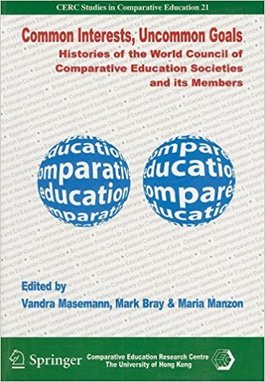
|
For ordering hard copies of the book, please click on the link below: Book: Common Interests, Uncommon Goals - Histories of the World Council of Comparative Education Societies and its Members, edited by Masemann, Bray and Manzon, 2007 |
- Home
-
About WCCES
- WCCES History Book
- WCCES Leadership
- WCCES Executive Committee
- WCCES Presidents
-
WCCES Working Groups
>
- Admissions & New Societies Standing Committee
- Congress Standing Committee
- Constitutional Standing Committee
- Ethics Standing Committee
- Finance Standing Committee
- History & Records Management Standing Committee
- Inclusion Standing Committee
- Publications Standing Committee
- Research Standing Committee
- Special Projects Standing Committee
- UNESCO Liaison Standing Committee
- Election Task Force
- Journal-Chronicle Task Force
- Peace Education Task Force
- Task Force to Bring Back Withdrawn Societies
- Task Force on Congress Periodicity, Bidding Cycles and Number of Host Societies
- Task Force on Distance Education
- USA-UNESCO Relations Task Force
- 4th WCCES Symposium 2021
- 5th WCCES Symposium 2022
- XVIII World Congress 2024
-
Past Congresses
>
- XVII World Congress, Cancún, Mexico, 2019
- XVI World Congress, Beijing, China, 2016
- XV World Congress, Buenos Aires, Argentina, 2013
- XIV World Congress, Istanbul, Turkey, 2010
- XIII World Congress, Sarajevo, Bosnia & Herzegovina, 2007
- XII World Congress, Havana, Cuba, 2004
- XI World Congress, Chungbuk, South Korea, 2001
- X World Congress, Cape Town, South Africa, 1998
- IX World Congress, Sydney, Australia, 1996
- VIII World Congress, Prague, Czech Republic, 1992
- VII World Congress, Montreal, Canada, 1989
- VI World Congress, Rio de Janeiro, Brazil, 1987
- V World Congress, Paris, France, 1984
- IV World Congress, Tokyo, Japan, 1980
- III World Congress, London, UK, 1977
- II World Congress, Geneva, Switzerland, 1974
- I World Congress, Ottawa, Canada, 1970
- WCCES Announcements
- WCCES Statutes & By-laws
- Current Member Societies of WCCES
- Procedure to be a Member Society of WCCES
- Contact Us
-
Global Comparative Education: Journal of the WCCES
- GCE Editor's Message
- GCE Advisory Board
- GCE Editorial Team >
- GCE Policy on Publication Ethics
- GCE Submission Guidelines
- GCE Reviewing Guidelines
- GCE Vol. 1 No. 1 (Mar. 2017) >
- GCE Vol. 2 No. 1 (Mar. 2018)
- GCE Vol. 2 No. 2 (Sep. 2018)
- GCE Vol. 3 No. 1&2 (Sep. 2019)
- GCE Vol. 4 No. 1&2 (Sep. 2020)
- GCE Vol. 5 No. 1&2 (Sep. 2021)
- GCE Vol. 6 No. 1 (Sep. 2022) Special Issue
- GCE Vol. 6 No. 2 (Dec. 2022)
- GCE Vol. 7 No. 1 (June 2023)
- GCE Vol. 7 No. 2 (Sep. 2023)
- WCCES-Brill Book Series

